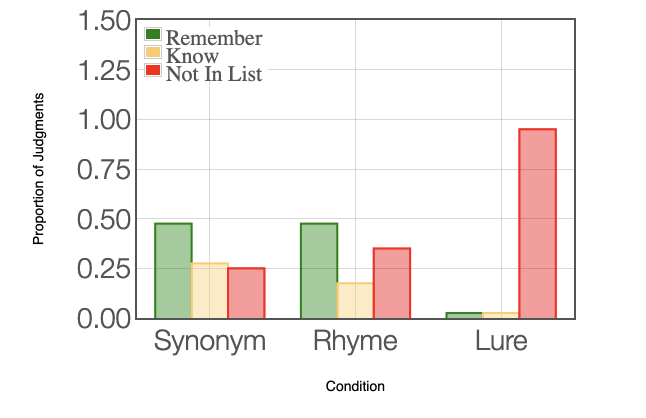Introduction
One of the fundamental questions in cognitive psychology is the identification of patterns of human memory functioning. Memory can work differentially depending on whether or not some associative experience preceded memorization (Rajaram, 1993). This report explores patterns in the Remember/Know pattern, where the participant either “just knows” or remembers specific memories. The goal is to determine whether the depth of prior experience affects the ability to remember textual information.
Methods
The experiment consisted of two phases, the first involving memorization and the second involving writing. During the first phase, individuals were sequentially offered words (N = 80) with a transition interval of five seconds. The participant had to perform a task for the proposed word, namely, to pick up a synonym or a rhyming word. The goal was not to determine the ability to pick the right words but to create a cognitive exercise that would form a stronger associative relationship with the proposed word. After completing the first phase, individuals were offered a list of 160 words, of which half had been previously presented. The task in this phase was to test the individual’s ability to discover/remember the words that had been shown earlier and to answer the question of whether the participant “remembered” or “just knew” that a particular word was on the initial list. Thus, the independent variable of the experiment was the condition, namely the selection of a synonym or rhyme, and the dependent factor was the number of correctly selected responses in the second phase.
List of Materials
- A blank sheet of paper
- Pencil
- Virtual environment for the experiment
Results
Table 1 contains the results of the experiment, which includes the proportions of correct responses as a function of test conditions, and Figure 1 contains a visualization of this data. As can be seen from the results, there was no difference in the number of words that were memorized and thus associated with the association (cognitive exercise) for rhyme or synonym-selection. However, a difference was observed for the number of words that the respondent “just knew” and those that were on the list. Interestingly, in the conditions of synonym selection (deep cognitive exercise) and rhyme selection (shallow cognitive exercise), the proportion of correct responses was higher for memorization than for the procedural memory system.
Table 1. Primary results collected during the experiment


Conclusions
The experiment demonstrated an individual’s ability to remember words more effectively when they were preceded by some cognitive exercise. The proportion of correct responses when the individual was unsure of the associative connection was higher for synonyms than for rhymes, which means that some of the prior experience may be hidden in the participant’s memory but influence their decisions.
Reference
Rajaram, S. (1993). Remembering and knowing: Two means of access to the personal past. Memory & Cognition, 21, 89-102. Web.